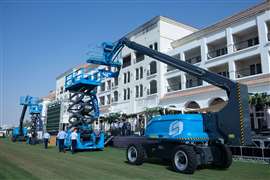December 2018: Sarens has a reputation for innovation, so when our wind industry clients asked for a solution that could help them better service blade repairs and perform upgrades, Sarens said yes. Currently, Sarens Canada is developing a fixed man basket that can be attached to any mobile crane. Robert Janssen, KAM Canada discusses this newest innovation as well as key trends in the region:
Tell us about the fixed man basket that Sarens is developing.
We’re designing the new fixed man basket in response to numerous wind industry clients who have requested a better solution for performing blade repairs. They wanted to see a design that would eliminate the need for two tag line persons and save on labour costs associated with operating traditional man baskets. They also wanted to address the limitations of so-called Bronto Skylifts, which were a challenge in some Canadian provinces due to axle load restrictions.
With this information, we started creating preliminary designs and asked RED Engineering to complete the final structural calculations and designs to comply with Canadian crane standards Z150, OH&S and all applicable rules and regulations for man basket use.
What are some of the key market trends in this region?
We’ve observed that the oil and gas industry is in a holding pattern, and maintenance is holding steady but with no major new construction planned. Major upgrade projects in the oil and gas industry should re-start by 2020, based on recent RFP requests. However, there is growth in proposed LNG gas terminals on the east and west coasts of Canada and Sarens Canada is actively engaged in heavy lift and transport proposals for these terminals.
Meanwhile, the renewable energy market is in a fast growth period, and the Canadian government is pushing for a cleaner energy program and providing grants for clean energy projects. The wind sector is quickly expanding: turbines are getting bigger and new wind projects are being proposed on a regular basis. Over the next five years, Canada wants to grow their wind-generated power grid by 20%.
How does Sarens Canada serve the wind industry?
Sarens Canada currently provides crane and transport services for new construction and maintenance projects at onshore wind farms. Our cranes serve all aspects of a wind farm project. For example, smaller RT cranes are used for pre-construction of wind turbine bases and as assist cranes for assembling larger all-terrain and crawler cranes. The bigger all-terrain cranes are used to install the first wind tower sections, and large crawler cranes to top out the wind turbine, installing the nacelle and hub assemblies with the blades.
Clients choose Sarens because of our in-house engineering capabilities, field personnel with extensive wind industry experience, and our well-maintained fleet of cranes. These factors make Sarens Canada an excellent partner to our clients.
Can you tell us about some of Sarens Canada’s major wind farm projects?
A few of our projects include:
Nicolas-Riou Wind Farm. This 224.25MW wind farm is composed of 65 Vestas V117 wind turbine generators. As one of the crane suppliers, Sarens has rented two LR1600 SL4DBF 120 + 12 to EPC contractor Borea Construction. Because of turbine delivery challenges, we also rented out an LR1750 SL7DHS 126 + 6 to help with project completion before wintertime.
Western Lily Wind Farm for Borea Construction. This wind farm project is located in Saskatchewan and involves the installation of 10 Enercon E-92 WEC on a challenging schedule due to the short window between seasons. We’re using the CC2400 SSL 90m and LF2 12m for this project.
KH3 Wind Project for Skyflo Consulting. This Kent Hills Wind Farm project, located in New Brunswick, involved the erection of 5 Vestas V126 WTG on 117-metre towers using the LR1600 SL4DBF 120 + 12. Despite challenges like narrow site roads that required crane disassembly and reassembly for each move, the project was executed successfully, on time, and without incidents.
Halkirk Wind Project for Capital Power Corporation. We used an LTM1130 with man basket to perform blade repairs, and despite challenging weather conditions the job was done safely and on time.
How do you ensure safety on each project?
Safety is paramount to Sarens Canada. We run an extensive in-house operator competency program and provide a crane simulator to improve training time for operators. We ensure that all procedures are followed exactly as specified by the crane manufacturer, and daily toolbox talks are conducted prior to each shift start. We are proud of our safety culture at every level of the organisation, and we ensure that all personnel are actively involved in Sarens’ safety programs.







